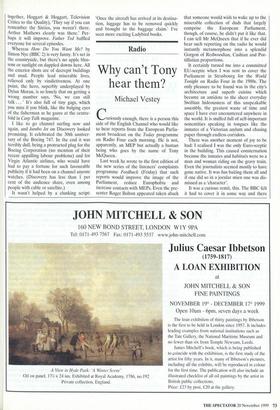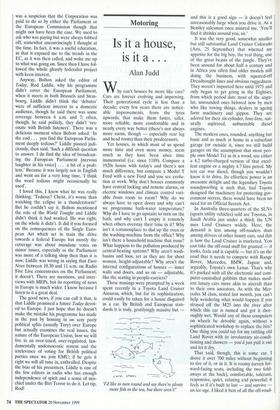Radio
Why can't Tony hear them?
Michael Vestey
Curiously enough, there is a person this side of the English Channel who would like to hear reports from the European Parlia- ment broadcast on the Today programme on Radio Four each morning. He is not, apparently, an MEP but actually a human being who goes by the name of Tony McQueen. Last week he wrote to the first edition of the new series of the listeners' complaints programme Feedback (Friday) that such reports would improve the image of the Parliament, reduce Europhobia and increase contacts with MEPs. Even the pre- senter Roger Bolton appeared taken aback that someone would wish to wake up to the miserable collection of duds that largely comprise the European Parliament, though, of course, he didn't put it like that. I can tell Mr McQueen that if he ever did hear such reporting on the radio he would instantly metamorphose into a splendid Gorgon of Redwoodian, Cashian and Por- tillistian proportions. It certainly turned me into a committed EU-sceptic when I was sent to cover the Parliament in Strasbourg for the World Tonight on Radio Four in the 1980s. The only pleasure to be found was in the city's architecture and superb cuisine which became an antidote to the sheer everyday Swiftian hideousness of this unspeakable assembly, the greatest waste of time and space I have ever encountered anywhere in the world. It is stuffed full of self-important nonentities speaking in tongues like the inmates of a Victorian asylum and chasing paper through endless corridors. There was another moment of joy to be had: I realised I was the only Euro-sceptic in the building. This caused consternation because the inmates and habitués were to a man and woman riding on the gravy train. Even the journalists seemed mostly to have gone native. It was fun baiting them all and if one did so in a jocular mien one was dis- missed as a 'character'.
It was a curious remit, this. The BBC felt it had to cover it in some way and there was a suspicion that the Corporation was paid to do so by either the Parliament or the European Commission though that might not have been the case. We used to ask who was paying but were always fobbed off, somewhat unconvincingly I thought at the time. In fact, it was a useful education, in that it exposed me to the trends in the EC, as it was then called, and woke me up to what was going on. Since then I have fol- lowed the whole ghastly federalist project with keen interest.
Anyway, Bolton asked the editor of Today, Rod Liddle, why his programme didn't cover the European Parliament, when it meets in both Brussels and Stras- bourg. Liddle didn't think the 'debates' were of sufficient interest to a domestic audience, though he said there was some coverage between 6 a.m. and 7; often, though, he said politely, they didn't 'res- onate with British listeners'. There was a delicious moment when Bolton asked: 'In the end . .. you find the European Parlia- ment deeply tedious?' Liddle paused judi- ciously, then said, 'Such a difficult question to answer. I do find the idea of broadcast- ing the European Parliament [nervous laughter in his voice) . .. a bit of a prob- lem.' Because it was largely not in English and went on for a very long time, 'I think the word tedious might occasionally be used'.
I loved this. I knew what he was really thinking: 'Tedious? Christ, it's worse than watching the eclipse in a thunderstorm!' But he couldn't say it. Bolton mentioned the role of the World Tonight and Liddle didn't think it had worked. He was right; on the whole it didn't. It did if you focused on the consequences of the Single Euro- pean Act which set in train the drive towards a federal Europe but mostly the coverage was about mundane votes on minor issues, especially as the Parliament was more of a talking shop then than it is now. Liddle was wrong in saying that Euro News between 10.30 and 11 a.m. on Radio Five Live concentrates on the Parliament; it doesn't. There are mentions, and inter- views with MEPs, but its reporting of news in Europe is much wider. I know because I listen to it a great deal.
The good news, if you can call it that, is that Liddle promised a future Today devot- ed to Europe. I just hope that he doesn't make the mistake his programme has made in the past by homing in on sexy party political splits (usually Tory) over Europe but actually examines the real issues, the nature of the European Union, how we will live in an over-taxed, over-regulated, fun- damentally undemocratic system and the irrelevance of voting for British political parties once we join EMU; if he gets it right we will all tune in, enthralled. Despite the bias of his presenters, Liddle is one of the few editors in radio who has enough independence of spirit and a sense of mis- chief under the Birt Terror to do it. Let rip, Rod!



























































































 Previous page
Previous page